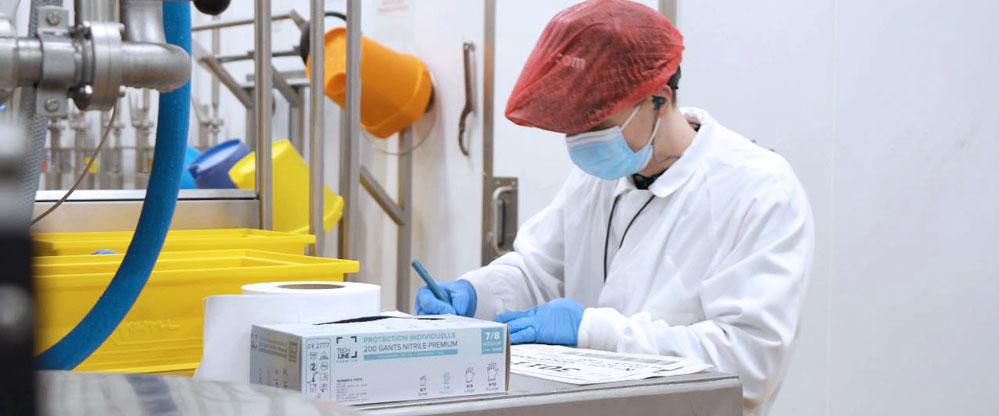How does b<>com's offer, by combining interaction design, artificial intelligence and human factors, concretely help industrial firms in the design of their production systems? Discover our intervention on the production line of Soreal in this article and in video.
What if Industry 4.0 offered new opportunities to improve the quality of life of operators on workstations? Coming up with concrete solutions to reduce operator fatigue and stress on the production line is the challenge taken up by b<>com and 21 other Breton companies following a study conducted by Bretagne Développement Innovation (BDI) among major industrial firms in 2020. Jointly conceiving the production line of the future, the fruit of the collective work was illustrated through 9 projects implemented in food industry manufacturers in the West of France.
It is within this framework that b<>com has partnered with TMS Studio to deploy a common solution on the line of the Soreal plant in Brie, under the eyes of the cameras.
Thanks to AI, the human being is at the center of the production line
Regarding assembly line work, the results of the BDI study highlighted the desire of manufacturers to reduce stress and musculoskeletal disorders (MSDs) that cause occupational illnesses in operators. To meet this demand, b<>com has partnered with TMS Studio, which has developed a suit that detects the operator's body movements and position in order to avoid bad postures, the main cause of MSDs. To go further, b<>com has enhanced the operator's equipment with biosensors to pick up several physiological signals such as cardiac and electrodermal activity (reflecting sweat levels and nervous system activity). These biosensors are non-invasive in order to adapt to any outfit and to avoid disturbing the worker in his task.
Collected in real time, the physiological data are synchronized and filtered, taking into account how the worker is feeling in the moment. These data are very useful for specific studies, for example via Machine Learning algorithms, in order to evaluate the operator’s cognitive state.
Guillaume Jégou, Human Factors Technologies Lab Manager: "The solutions we are developing combine hardware biosensor technologies with interpretation algorithms developed by our behavior analysis researchers. This combination of expertise aims to interpret certain cognitive dimensions in real time that are of interest in a professional setting. For example, we have worked on the detection of stress and mental workload, which can have an impact on health at work, but also in terms of safety and productivity. The use of artificial intelligence to better understand behaviors is also an important issue for the future development of more cooperative relationships between the operator and the machine, or the real-time adaptation of work environments in which the human is at the center."
To reduce occupational illnesses, Industry 4.0 relies on innovative technologies
E-mage-in-3D, a division of TMS Studio, was able to easily integrate the indicator created by b<>com into its interface dedicated to monitoring body posture: "This indicator adds crucial data on the operator’s health," explains David Pliquet, Director of E-mage-in-3D. "In the future, we believe that these data must be at the heart of the industrial production system. Today, GAFAs such as Google and Apple are starting to integrate these data. It is essential that food manufacturers are aware of this new situation and adopt these technologies in the coming years.”
Guillaume Jégou specifies that "b<>com has an ideal offer for companies that want to test this type of technology, b<>com *Ngagement*. We have other projects underway where the biosensors also monitor respiratory, ocular and brain activity so that we can adapt to any field of activity, depending on specific aspects to be studied (stress, cognitive load, performance, etc.). The strength of this approach is to be able to accompany companies in interaction design in the broadest sense. Not only can we help companies analyze the behaviors and cognitive states of workers, we can also help them evaluate their interaction concepts, simulate human-machine collaboration and modify test scenarios on the fly from the earliest stages of design. To do this, *Ngagement* integrates a complete virtual environment to validate the industrial design from the design phase and to reduce the risk of the innovation using objective behavioral measures".
>>> you want to explore how b<>com can help you innovate? You can contact our experts here.
Watch the video of the solution deployed at Soreal (French only):



